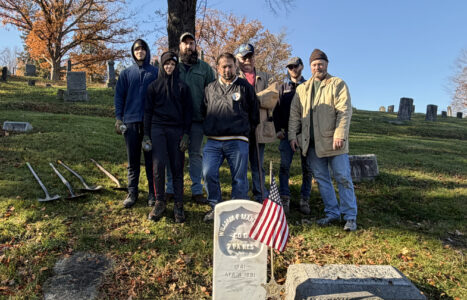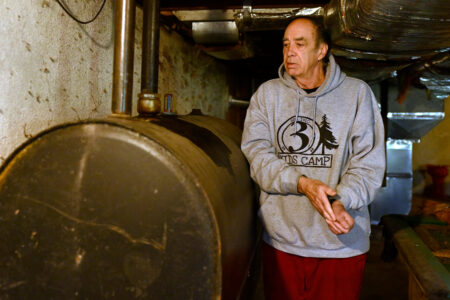Woodward supers moving ahead with loan for fire truck
DUNNSTOWN — Woodward Township supervisors are moving ahead with borrowing money to buy a new fire rescue-pump truck for Dunnstown Volunteer Fire Co., but not without controversy.
The proposed $842,00 truck, which the fire company says it cannot afford to buy on its own due to reduced fundraising because of COVID-19, consumed most of this week’s board meeting and caused shouting and swearing among those in attendance.
In the end, Supervisors Wayne Love, John Barth and Kyle Coleman will consider a letter of commitment for a loan backed by revenue from a 1 mill property “fire tax” enacted by the township supervisors in early 2020.
Firefighter Mike Fetzer said the volunteer company will secure the loan after documentation is settled and the letter is required to proceed.
The longer the decision is delayed, the more the truck could cost, he said. He told supervisors the cost of the new truck has shot up $90,000 since last year’s estimate and it could increase significantly more at the start of 2022.
The previous estimate was $750,000.
Chairman Love directed that the township’s new solicitor, Thom Rosamilia, who attended his first public meeting with supervisors this week, have the paperwork reviewed and finished as soon as is feasible.
Woodward Township collected about $127,000 from fire tax last year and about $132,000 as of this November.
Supervisor Barth said a 15-year loan might be the safest bet, but the supervisors and fire company agreed to push for a 15-year term with plans to pay it off in 10 years. The first 10 years could be at a fixed interest rate; last five years might involve an adjustable rate.
Fire company volunteers explained that the current rescue engine is just about 25 years old, yet it’s recommended such trucks be retired at 20 years.
The volunteers are facing growing maintenance costs, a lack of parts due, in part, to slow shipping. They intend to sell the truck and use the money from the sale toward the new engine.
Aside from imposition of the fire tax — Woodward is the first municipality in the region to do so — controversy has arisen because of the township dissolving its sanitary sewer authority and assuming that entity’s debt, thus impacting its own ability to borrow money.
Supervisor Coleman said he ran the numbers about whether the township should go with a 10-year fixed loan or a 15-year loan. He said there is a discount for multiple parts of the vehicle that would drop the price of it to around $818,000. The township is set to make a $100,000 down payment from the fire tax fund, leaving the initial loan at a little over $718,000.
Having been against reinstatement of the authority in order to basically co-sign a loan for the truck, Coleman readdressed his opinions and said he’s concerned about Dunnstown Fire Co.’s sustainability.
“As I said last year, I’ll repeat it again: I was 100% against the sewer authority being separated and potentially turn around and borrow for a fire truck. I said if you can obtain the financing, it is not messing with us here. The only other concerns I have — worst case scenario, the fire company goes under in three years — what do we do with a fire truck? I don’t want to anticipate that to happen. These are things we need to make sure that the township is prepared for,” he said. “I don’t see it happening, but let’s say it does. Dunnstown Fire Co. shuts down before this truck is paid off and we still have to continue to pay for it. We also have to pay to provide fire services. Last year Wayne talked to the city and they basically would want $130,000-some dollars to provide coverage to our township. We can’t pay both.”
Barth and Love indicated they would take Coleman’s concerns into consideration and agreed to put language in the letter of commitment to protect the township.
Rosamelia said the letter of commitment would not affect the township’s borrowing power if that was to be an issue.
He said the board could discuss a commitment outside of the letter of commitment for the loan to help the township with that concern.
Township resident Theresa Jacobs asked supervisors if they would make payments on the new truck since the fire company could not afford it.
Love affirmed that payments for the new truck will come from the fire tax revenue.
Jacobs also asked if the fire company pays any of its bills, or does the township pay them?
Fetzer said the township only pays the fire company’s fuel bills, while the fire company pays thousands in other maintenance, operational and other expenses it incurs.
On the subject of the fire tax, Love affirmed that the township will not be raising the fire tax and has no reason to do so.
However, two non-township residents identified with the Clinton County Watchdog group voiced concern with the skyrocketing inflation and growing levels of lower-income residents in the township.
Kevin Ferrara and Michele Whitney questioned if, at that cost, the new truck will benefit the township. They brought up the amount of local emergency service departments in and around Lock Haven with the same type of equipment. They suggested the loan terms and rate could be better negotiated.
In response, the fire company affirmed they went to many banks and financing outlets for the best terms.
Ferrara claimed the fire company was not contributing anything toward the truck.
“At the end of the day, you’re (township) making the payments and after 15 years, once it is paid off, the vehicle gets turned over to the Dunnstown Fire Co. What does the township benefit from that? What is the return investment on 15 years of paying?” he asked.
Love said all township residents will benefit from the truck due to the improved level of protection it will bring.
Ferrara said the township is required to provide fire protection no matter what, as it is a state law.
“But when we leave here, Lock Haven is not mandated to give it to us. We have got to buy it,” Love said.
Ferrara pushed Love and the other supervisors further on the notion of fire protection and if the truck purchase was even necessary. He brought up statistics from Clinton County dispatchers showing that 70% of the time, pumper engines are on Interstate 80, Greene Township, Mill Hall Township and Lamar Township. He said that if the truck is out on a call the fire company would have to rely on mutual aid if another emergency merits it.
“What is the return on investment? If Woolrich Fire Co. was responding as much as Dunnstown does to mutual aid and my house burned down and I am paying for a vehicle, I am either going to be coming after the fire company or coming after the township because you have an agreement. At the end of the day, the township is responsible for providing fire protection,” Ferrara said.
Supervisors took exception to Ferrara’s comments, saying the firefighters have always provided the protection needed and they questioned whether he had any statistics to the contrary.
Ferrara, who is not a resident in the township, had no such statistics.
Visibly upset, Love pushed Ferrara for more statistics to back up his claims.
“According to dispatch, 70% of your calls are outside of the township, 30% of your calls are here. A majority of what that vehicle is going to do is vehicle rescue on the highway. They have agreements with the fire departments,” Ferrara said.
Love made an effort to move the discussion back to the agenda, but tensions grew throughout the two and half hour meeting. Love said Dunnstown Fire is always available for calls in the township.
Coleman reiterated an argument he made in 2020: That the fire tax did not have to be a full 1 mill.
“If we go with a 15 year loan payment, that is $61,000 and we are bringing in $137,000, maybe potentially going to be $140,000 here before long. There is $81,000 extra sitting there each year, minus the costs going for maintenance on the trucks, which I am assuming is the biggest cost of this budget with the current rescue truck you currently have. That is going to drop a little bit,” Coleman said.
Township Secretary Jackie Bartlett cautioned supervisors to be careful because, if they are to order the truck, the fire company will not receive it for two years. It could take 14 to 16 months.
“If the truck is going to be halted for two years, the three-quarter of a mill tax would be justified. They have the $100,000 as a down payment,” Coleman said.
Bartlett said the township should sit tight on any fire tax change due to growing inflation and unknown future costs.
Love agreed, saying the board needs to closely monitor its 2022 and 2023 budgets.
Regardless, the township plans to start paying on the vehicle before receiving it.
Dissatisfied with supervisors’ information, Whitney referenced an article from The Express from April, when fire company official Doug Fetzer said, “We can confirm that we would not request the purchase of the rescue come from anywhere but our fundraising efforts, donations and/or funds received by the fire tax.”
She questioned fire officials about their fundraising and donations, saying everything involved in the letter of commitment is on the backs of the taxpayers.
Love called out Whitney, asking if she is even a taxpayer in Woodward Township.
“I am a federal and state taxpayer, yes,” she said, though denied that she was a taxpayer in the township. “I am not but I told you why I am here. I am also the founder of the Clinton County Watchdog group and we see transparency and accountability within the government. One of the main reasons why I am here is because this is an issue, there is a concern of the taxpayers and they need to know about these things. There is a lot of secrecy here, there are a lot of numbers flying about and there is not real true information and the taxpayers deserve to know,” she said.
Love questioned her comment about secrecy with township government. Whitney nonetheless asked what the letter of commitment entails and if the public will be presented with this in the future.
Love said the public will be made aware of what the documents state.
“This has been smoke and mirrors since the beginning. If you remember, we were going to get rid of the sewer house, then the municipal police officer was going to go in and have their own office at the fire company, and everything was going to be consolidated, which I love because I am a Republican and you should love that too. But it went in an opposite direction … you created the sewer authority as a cost to taxpayers and now you’re getting money from the fire tax and you’re going to be able to afford it and have to raise the fire tax,” Whitney said bringing up the debate of the sewer house that was met with contention involving the previous authority.
Love asked for evidence the township will raise the fire tax further.
Supervisors made it clear they will not be raising the fire tax nor any other tax in the township.
Coleman recommended getting everything in order and holding a meeting to present details to the public.
Saying that he wasn’t against doing what Coleman recommended, Love said he is against pushing the fire company past its January deadline for a letter for fear of another price increase.
Fire company members affirmed they had gotten multiple estimates, went through their advisory board and found the one they felt was the best.
Mike Fetzer said the volunteers have put a lot of work into finding the right truck at the best cost, along with the best financing terms.
“Despite what everyone thinks, we work very hard for the money we have. Tons of bills that the township doesn’t even see … we are sitting on top of a building that is worth $1 million and there is a lot of upkeep. We have guys that spend countless hours trying to prepare things. Come to our fundraisers. There are seven of us who do the fundraising every month… We do work very hard for what we have, we are not poor, we don’t have the money to get this — this is what the whole fire tax was created for. There are tons of municipalities in Pennsylvania that have much larger fire taxes than we do. It is not that we are just buying something to spend money, it is something that needs to be done. We are driving a fire truck now that the lights go out when you are driving down the road. It has been in the garage the past two days trying to get parts for it. We still don’t have the parts to fix it,” he said.
That didn’t stop Ferrara, though.
“How can the township purchase a vehicle without identifying the need for such vehicle? Are you just taking it upon what the fire department tells you or have you told the community or talked amongst yourselves?” Ferrara asked. “Maybe you do need a rescue pumper, I don’t know but how does the township at the end of the day come to the conclusion that this is what is needed and we’re going to pay for that vehicle. Because at the end of the day, the taxpayers are paying for that vehicle.”
Love said an advisory committee was formed and made its recommendation.
“It was put together and they came up with (a recommendation). I (offered) no say to the committee of what was to be done with the fire company, I merely listened,” he said.
Supervisors agreed to a right to know request from Ferrara and Whitney after a lengthy debate.
“Most people know the history now of how all that went down last year. This was about the same time last year we were starting conversations about the firetruck with them. We thought everything was going to be okay. Then went to check the borrowing money and couldn’t because the sewer authority dissolved and the debt went over to the township. The sewer authority had a bond that is owed on and we shut the sewer authority down and brought it to the township, and now the township is responsible,” explained Coleman.
Mike Fetzer cleared up that the truck had nothing to do with it.
He said take the fire company out of it and the township still had no borrowing power — “like having a business and you can’t get any funds.”
A debate flared up between Mike Fetzer and Coleman involving funding for the new truck.
Coleman acknowledged Fetzer’s statement, but said the township does not need to borrow money to buy a truck.
Coleman’s comment fired up Fetzer, who said, “If you don’t have the funds, you would have to borrow money.”
A shouting match erupted among supervisors, fire company members, watchdog members and others before Love brought the meeting back to order.
Love said there were problems with the sanitary sewer authority and to correct those problems, eliminating the authority was necessary.
“Nobody was aware of the financial situation with shutting (the authority) down. That (impact on the township’s abilty to borrow money) was never brought up or addressed. None of that was ever talked about. Whenever we shut the sewer authority down, nobody was aware of the borrowing situation.
“The (sewer) board wasn’t working together. There was not one thing being fixed. The infiltration that needed fixed wasn’t being done, nothing was being done,” Love argued.
Coleman said the federal American Rescue Plan money will be a big benefit to the sewer authority getting reinstated.





